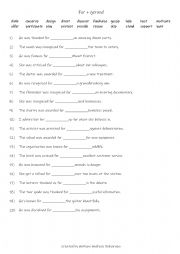
|
A2+-B1 reasons for doing something using: for + gerund (2)
First, students need to familiarise themselves with the 20 verbs and their use. Then they read the sentences to see which one is needed to complete the gap-fill. Answers on page 2.
Level: intermediate
Age: 10-100
Type:
Downloads: 120
|
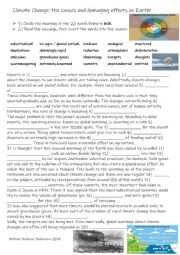
|
Climate Change: The causes and damaging effects on Earth!
360-Word reading article with a 20-word gap fill exercise about Climate Change. It takes an in-depth look at the causes, effects and what governments are doing to rectify this problem.This sheet is suitable for higher level A2 to B1 students of all ages. An answer sheet is included. For higher level students they could be put in groups to give / pr...
Level: elementary
Age: 12-100
Type: worksheet
Downloads: 1961
|
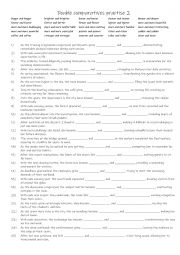
|
B1+-B2 25 Double comparatives Part 2
Double comparatives are used to describe a situation where something increases or decreases progressively. By repeating the comparative form, we emphasise how the quality or action becomes more extreme. This structure is common in English, and learning it can help express change in a dynamic and descriptive way. Native speakers use double comparati...
Level: intermediate
Age: 9-100
Type:
Downloads: 102
|
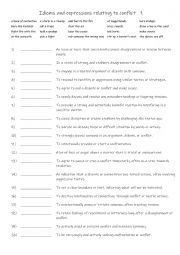
|
B1+-C1 Idioms and expressions relating to conflict 1
First, students need to familiarise themselves with the 20 idioms and expressions and their meanings. Then they read the definitions to see which one is being described and write that word in the space provided Answers on page 2.
Level: intermediate
Age: 12-100
Type:
Downloads: 106
|
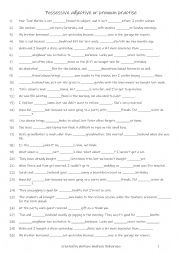
|
A1+-A2 Possessive adjectives & possessive pronouns practise 2
Learning possessive adjectives and possessive pronouns is essential for expressing ownership and relationships clearly and naturally in English. Possessive adjectives (like my, your, his, her) are used before nouns to show who something belongs to, while possessive pronouns (like mine, yours, his, hers) stand alone and replace nouns, avoiding repet...
Level: elementary
Age: 8-100
Type:
Downloads: 105
|
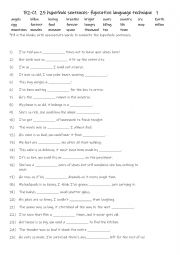
|
B2-C1 25 hyperbole sentences- exaggerating figurative language technique 1
Learning hyperbole enhances creativity and helps students to express ideas vividly, making their writing more engaging and impactful. It improves communication skills by adding humour or emotional depth, while also fostering a better understanding of cultural and literary nuances. Recognising and using hyperbole sharpens analytical thinking, as stu...
Level: advanced
Age: 15-100
Type: worksheet
Downloads: 126
|
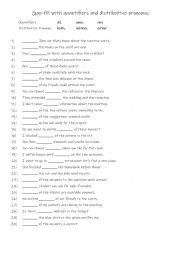
|
A2+-B1 Gap-fill with quantifiers and distributive pronouns
This worksheet gives students this chance to practise using quantifiers and distributive pronouns. In everyday situations, they are used frequently. For example, when shopping, discussing quantities, or distributing tasks, these words help you convey your message more clearly and efficiently.
By learning quantifiers and distributive pronouns, you ...
Level: intermediate
Age: 10-100
Type:
Downloads: 110
|
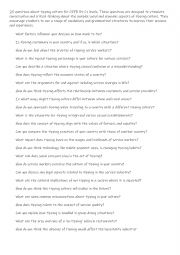
|
Tipping culture for CEFR B1-C1 (2)
25 questions about tipping culture for CEFR B1-C1 levels: These questions are designed to stimulate conversation and critical thinking about the complex social and economic aspects of tipping culture. They encourage students to use a range of vocabulary and grammatical structures to express their opinions and experiences.
Level: advanced
Age: 16-100
Type:
Downloads: 109
|
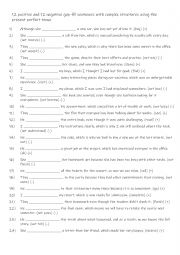
|
A2-B1 Present perfect practise
Students read the sentences and complete it using the present prefect and the clue (+) or (-). There are 12 positive and 12 negative sentences. This worksheet is suitable for A2-B1 students as it contains complex sentences. Answers on page 2.
Level: elementary
Age: 10-100
Type:
Downloads: 121
|
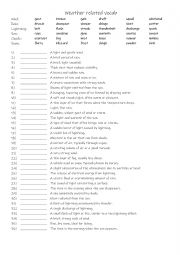
|
A2+-B1 35 weather related words
Students should learn weather-related vocabulary because it improves their ability to describe and discuss weather conditions accurately, which is a common topic in daily conversations and small talk. These words also help students better understand weather forecasts, reports, and natural phenomena, enhancing their listening and reading comprehensi...
Level: intermediate
Age: 10-100
Type:
Downloads: 117
|












